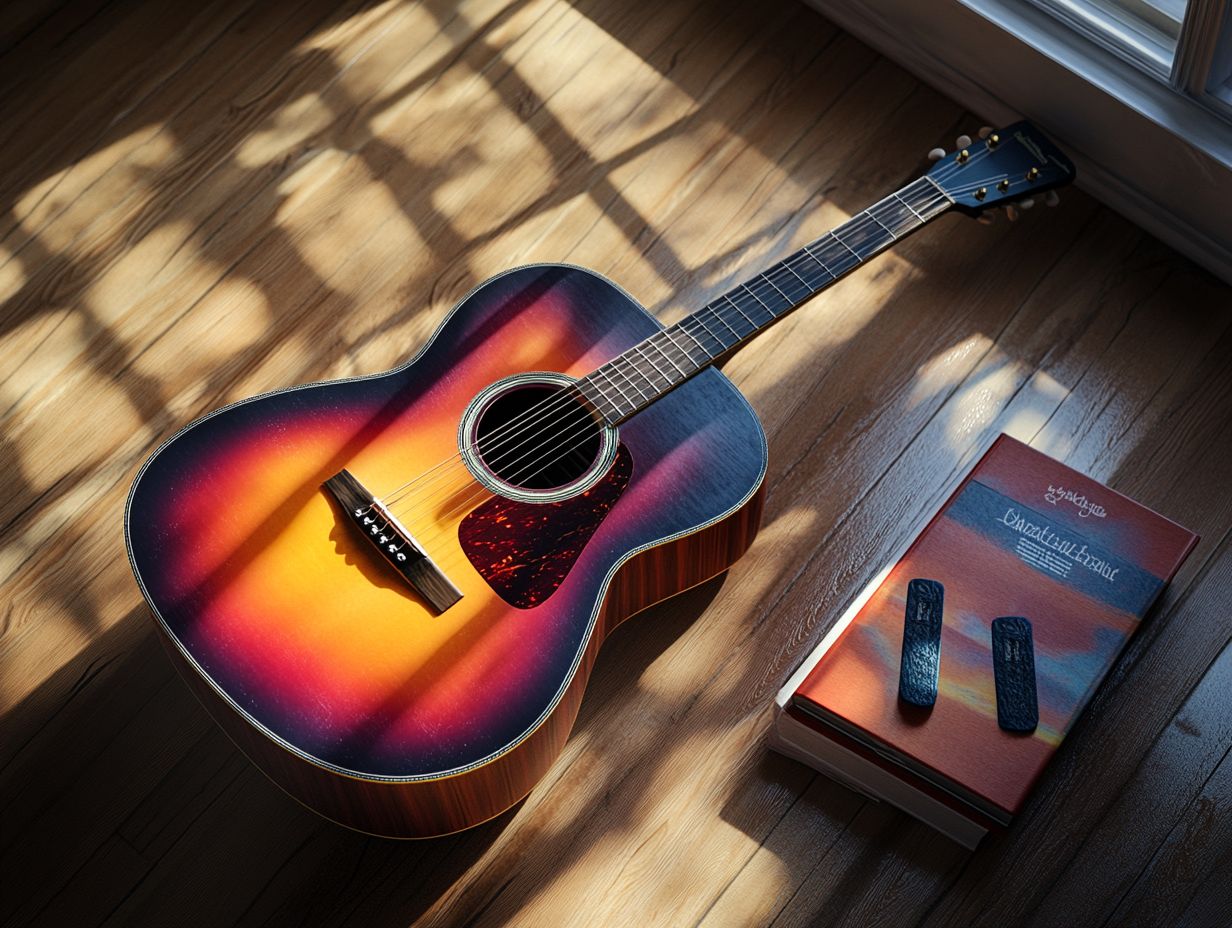Choosing the appropriate guitar is essential for individuals embarking on their musical journey.
With a variety of options available, ranging from acoustic to electric guitars, the selection process may seem overwhelming.
This guide aims to outline the types of guitars that are suitable for beginners and to highlight the key factors to consider, including budget, size, and sound quality.
Additionally, it provides recommendations for top picks and essential accessories to enhance the overall experience, along with effective practice strategies to facilitate progress toward mastery.
Explore this guide to identify the ideal guitar for beginners.
Why Choosing the Right Guitar Matters

Selecting the appropriate guitar is essential for any aspiring musician, particularly for beginners, as it can profoundly impact their learning experience and overall enjoyment of music-making.
Whether one is attracted to the rich tones of an acoustic guitar or the dynamic sounds of an electric guitar, making the right choice can significantly enhance practice routines and skill development.
Important factors such as guitar types, brands, and features play a critical role in ensuring that the instrument aligns with the player’s individual style and musical aspirations.
A suitably chosen guitar can foster motivation, facilitate the learning of music theory, and ultimately serve as a valuable long-term investment in one’s musical development.
Types of Guitars for Beginners
Embarking on a musical journey necessitates a thorough understanding of the various types of guitars available, which can assist in making an informed decision tailored to the needs of a beginner.
Acoustic guitars are renowned for their resonant sound and simplicity, while electric guitars provide versatility and accommodate a wide range of musical genres. Each type offers unique advantages.
Key features such as weight, size, and playability are particularly important for beginners, especially for those who desire a lightweight instrument that is manageable while learning chord progressions and strumming patterns.
Choosing the appropriate type of guitar can establish a solid foundation for one’s musical growth and overall enjoyment.
Acoustic vs. Electric Guitars
When comparing acoustic and electric guitars, it is crucial to recognize that each instrument presents distinct advantages, catering to a variety of musical preferences and playing styles. Acoustic guitars are renowned for their exceptional sound quality and resonance; they are often more portable, making them ideal for singer-songwriters and those who appreciate a raw, organic tone.
Conversely, electric guitars offer greater versatility, enabling players to explore a wide range of musical genres and tonal modifications through the use of effects pedals and amplifiers. Understanding these differences allows beginners to align their instrument choice with their musical aspirations and comfort levels.
Moreover, it is not solely the sound that distinguishes these instruments; playability plays a significant role in this differentiation. Beginners frequently find acoustic guitars relatively easy to pick up due to their straightforward design. However, some may encounter challenges related to finger strength and pressing down on the strings.
In contrast, electric guitars typically feature lighter strings and lower action, which can enhance playability and comfort. Nevertheless, while the electric option tends to be more forgiving on the fingers, it also entails navigating the complexities of technology, such as setting up amplifiers and selecting effects, which may present a steeper learning curve.
Considerations such as portability and durability are also important; acoustic guitars are often more robust for outdoor use, whereas electric guitars may require more careful handling due to their components. Ultimately, the choice of instrument depends on what resonates with the individual player.
Factors to Consider When Choosing a Beginner Guitar
Selecting the appropriate guitar for a beginner necessitates careful consideration of several factors that can significantly impact the player’s experience and development.
Budget is often a primary concern, as many beginners seek an affordable yet high-quality instrument to commence their musical journey.
Furthermore, aspects such as guitar size, sound quality, and playability are essential; an instrument that fits comfortably in the hands and produces a pleasing tone can greatly enhance practice sessions.
Additionally, understanding fundamental guitar features, including neck profile and fretboard design, is vital for making an informed decision.
Budget and Quality
When searching for a budget guitar, it is essential to achieve a balance between affordability and quality to ensure a satisfactory playing experience. Many beginners may be inclined to select the most inexpensive option available; however, understanding quality control standards and seeking reputable guitar brands can lead to the acquisition of a more durable and enjoyable instrument.
Investigating warranty options, customer reviews, and ratings can provide valuable insights into the long-term value of the guitar, thereby guiding newcomers toward a sound investment in their musical journey.
Dedicating time to research each aspect can significantly enhance the likelihood of finding an instrument that aligns with an individual’s personal style and skill level. Considering elements such as craftsmanship, materials used, and the potential for adjustments or upgrades over time can greatly influence the player’s overall satisfaction.
By closely examining professional reviews and detailed consumer ratings, prospective buyers can differentiate between models that may initially appear similar but differ significantly in sound quality and durability. Additionally, engaging with online forums and communities can yield valuable insights, enabling aspiring musicians to make well-informed decisions that meet their specific needs.
Size and Comfort

The size and comfort of a guitar are critical factors for beginners, as they directly influence playability and the overall learning experience. A guitar that fits comfortably in one’s hands will enhance the ability to practice chord progressions and finger positions effectively.
Familiarity with terms such as scale length and fret size can assist in selecting a guitar that not only offers comfort but also allows for improved intonation and action. It is important to choose a size that accommodates one’s body type, as this will promote a more enjoyable practice routine and facilitate skill development.
It is essential to recognize that not all guitars are created equal; varying shapes and dimensions can significantly impact the ease with which one can reach the frets and strum the strings.
When exploring options, aspiring musicians are advised to try multiple models in different sizes to ascertain what feels most natural. This exploration may involve experimenting with shorter or longer scales, as these variations can drastically affect string tension and overall playability.
By actively engaging with a diverse range of instruments, individuals can discover the optimal balance of comfort and functionality, thereby laying the foundation for a rewarding musical journey.
Sound and Tone
Sound quality and tone are essential factors to consider when selecting a beginner guitar, as they significantly influence musical expression and overall enjoyment. The body shape and design of the guitar can affect its resonance and sound production, making it crucial to test different models to identify one that aligns with individual preferences.
A thorough understanding of pickup types for electric guitars can assist in achieving the desired tone for various musical genres, thereby enhancing the exploration of diverse musical interests.
Different body shapes, such as dreadnought, concert, or telecaster, create distinctive sound profiles, each offering unique advantages in terms of projection and warmth. It is advisable for beginners to invest time in playing various guitars, attentively listening to how each instrument resonates and contributes to a richer tonal quality.
The choice between single-coil and humbucker pickups can significantly influence the guitar’s sound signature, impacting aspects ranging from clarity to warmth across various dynamic styles. Ultimately, engaging in experimentation with different options allows players to establish a profound connection with their instrument, fostering a personalized sound that authentically reflects their individuality.
Top Picks for Beginner Guitars
Selecting an appropriate beginner guitar can be a challenging endeavor due to the extensive array of options offered by various brands and models designed for entry-level players.
It is crucial to consider not only the price range but also the specific features that correspond with one’s playing style and musical preferences.
Whether the individual is interested in strumming along with popular music genres or exploring fingerstyle techniques, certain brands have established a reputation for producing reliable and user-friendly instruments that cater to beginners.
Recommendations based on quality, craftsmanship, and features can significantly aid in making an informed decision.
Recommended Brands and Models
When recommending specific brands and models of beginner guitars, several options are distinguished by their quality, affordability, and favorable reviews from the player community. Reputable guitar brands frequently offer entry-level models that successfully combine quality craftsmanship with user-friendly features, making them suitable for novice players.
Whether one seeks an acoustic guitar with a solid top for enhanced sound projection or an electric guitar that provides versatility across various music genres, exploring detailed reviews and ratings can assist in identifying the most appropriate choice to meet individual needs.
For example, the Yamaha FG800 acoustic guitar is consistently recognized for its solid spruce top and exceptional sound quality, rendering it a preferred option among new players. Priced around $200, it delivers significant value for money while producing a warm, rich tone.
Conversely, the Squier Stratocaster serves as a classic electric model that appeals to those embarking on their musical journey. Its comfortable neck and diverse tonal options make it well-suited for genres ranging from rock to blues, and it is typically available for approximately $300.
User feedback emphasizes the ease of playability and the rewarding learning experience that each of these models offers, further solidifying their reputation as top choices for beginners.
Essential Accessories for Beginner Guitarists
To ensure a successful initiation into the world of guitar playing, possessing the appropriate accessories can significantly enhance both the learning experience and the maintenance of the instrument.
Essential guitar accessories encompass protective cases and gig bags, which provide crucial safeguarding for the instrument during transport and storage. Additionally, tuners are vital for maintaining tuning stability.
Other useful items, such as picks, capos, and instructional books, can further enrich practice sessions, facilitating the understanding of guitar techniques and the fundamentals of music theory.
Investing in high-quality accessories not only protects the guitar but also fosters personal growth as a musician.
What You Need to Get Started

Beginning your guitar journey necessitates more than merely acquiring a beginner guitar; it is imperative to equip yourself with the appropriate accessories and resources to facilitate effective learning.
Investing in high-quality accessories not only enhances the overall playing experience but also fosters the development of good habits from the very beginning. For example, a well-padded strap can mitigate discomfort during extended practice sessions, while a sturdy case will safeguard your instrument during transport.
To advance the learning process, aspiring guitarists should consider enrolling in online courses that provide structured lessons and guided practice sessions, thereby enhancing motivation and engagement.
Additionally, utilizing practice aids such as instructional books or video tutorials can offer invaluable support, ensuring learners attain a solid understanding of essential techniques and music theory as they progress in their musical endeavors.
Tips for Learning and Practicing on a Beginner Guitar
Establishing a solid foundation in learning and practicing the guitar is essential for the development of skills and the enhancement of one’s enjoyment of music.
To learn guitar effectively, it is important to create a structured practice routine that incorporates various techniques, including chord progressions, strumming patterns, and fundamental concepts of music theory.
By setting achievable goals and utilizing resources such as instructional books or online courses, individuals can maintain motivation and monitor their progress as they become more proficient players.
Furthermore, seeking feedback from online communities and mentors can offer valuable support throughout their musical journey.
Effective Practice Strategies
Implementing effective practice strategies can substantially impact progress for beginner guitarists, leading to enhanced skills and increased enjoyment in playing. Establishing a consistent practice routine that prioritizes essential components such as finger positions, chord progressions, and strumming patterns will provide a solid foundation for one’s musical journey.
Additionally, incorporating feedback mechanisms, whether through online forums or mentorship opportunities, can offer valuable insights and motivation to help mitigate common beginner mistakes.
It is vital to set achievable goals within practice sessions, ensuring sustained engagement and appropriate challenges without overwhelming oneself. Beginners should also explore the diverse learning resources available online, including tutorial videos, interactive applications, and sheet music, which can significantly deepen their understanding of the instrument.
Regular participation in virtual communities with other aspiring musicians fosters knowledge sharing and camaraderie, contributing to a more enriching experience. It is important to remember that the journey of learning to play the guitar is not a race; therefore, maintaining focus on key skills while exercising patience with oneself is essential for long-term success.
Frequently Asked Questions
What is the best guitar for beginners?
The best guitar for beginners is one that is comfortable to play, has good sound quality, and is within your budget. Some popular options include the Yamaha FG800, Fender CD-60S, and Epiphone DR-100.
What should I look for when choosing a guitar for beginners?

When choosing a guitar for beginners, look for one with a smaller body size, a comfortable neck, and low action (distance between strings and fretboard). It’s also important to consider the type of music you want to play and choose a guitar that suits that style.
Do I need to spend a lot of money on a guitar for beginners?
No, you don’t need to spend a lot of money on a guitar for beginners. There are many affordable options that still offer good quality and sound. It’s important to find a guitar that fits your budget and meets your needs as a beginner player.
Should I get an acoustic or electric guitar as a beginner?
This depends on personal preference and the type of music you want to play. Acoustic guitars are generally easier to learn on and are great for playing a wide range of music styles. Electric guitars may be better suited for specific genres, such as rock or metal, but may require additional equipment.
Are there any specific brands that are best for beginner guitars?
Some popular and reliable brands for beginner guitars include Yamaha, Fender, Epiphone, and Ibanez. These brands offer a variety of affordable options with good quality and playability.
Do I need any additional equipment or accessories for a beginner guitar?
It’s recommended to have a few essential accessories for your beginner guitar, such as a tuner, guitar picks, and a strap. These can help improve your playing experience and make learning easier. It’s also important to have a sturdy guitar case or bag to protect your instrument.


 Studio Monitors vs Headphones: Choosing the Best Audio Equipment
Studio Monitors vs Headphones: Choosing the Best Audio Equipment